We may not have the course you’re looking for. If you enquire or give us a call on 01344203999 and speak to our training experts, we may still be able to help with your training requirements.
Training Outcomes Within Your Budget!
We ensure quality, budget-alignment, and timely delivery by our expert instructors.
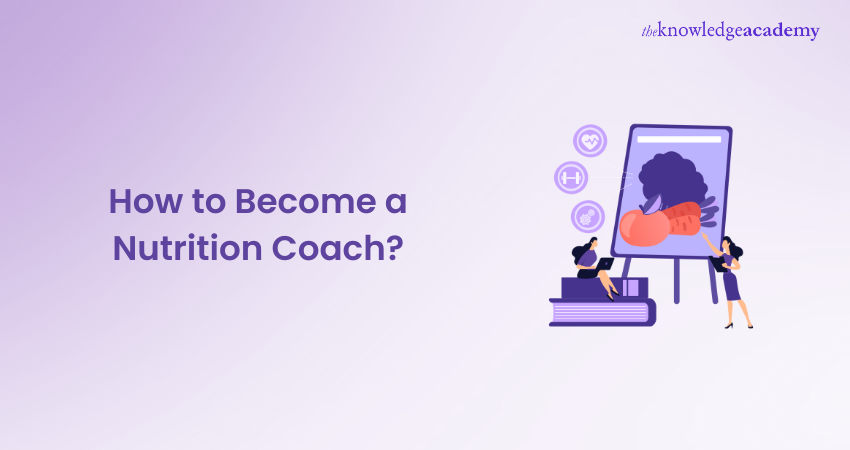
Becoming a Nutrition Coach is an exciting and transformative journey. Here's How to Become a Nutrition Coach with the right blend of education, experience, and skills.
First, obtain a relevant degree or certification in nutrition to build a solid foundation. Gain practical experience through internships or volunteering to refine your skills. Enhance your communication and coaching techniques to effectively engage clients. Ensure you understand and comply with local regulations and certification requirements.
The key to How to Become a Nutrition Coach is connecting with clients on a deeper level, understanding their unique needs, and inspiring lasting change. This journey will enrich both your life and the lives of those you coach.
Table of Contents
1) The Role of a Nutrition Coach
2) Education and Qualifications
3) Developing Essential Skills
4) Gaining in-depth Knowledge
5) Understanding Client Needs
6) Building a Clientele
7) Practical Experience
8) Legal and Ethical Considerations
9) Difference Between a Nutrition Coach and a Registered Dietitian
10) Continuing Professional Development
11) Starting your Nutrition Coaching Career
12) How long does it take to become a certified Nutrition Coach?
13) How much can I earn as a Nutrition Coach?
14) Conclusion
The Role of a Nutrition Coach
A Nutrition Coach guides individuals toward optimal health by providing personalised dietary and lifestyle advice. This role involves more than just giving out generic meal plans or nutritional information. It requires a deep understanding of what the individual needs, a holistic approach to well-being, and practical coaching skills to facilitate lasting behaviour change.
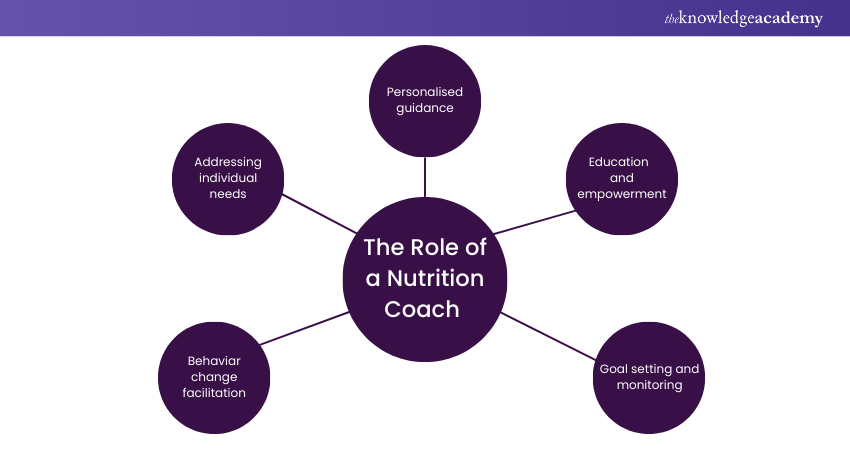
One of the most important responsibilities of a Nutrition Coach is to provide personalised guidance to clients. This involves assessing everyone's dietary preferences, health goals, medical history, and lifestyle factors. By understanding these aspects, a Nutrition Coach can develop a tailored plan that aligns with the client's objectives and sets them up for success.
Beyond handing out diet plans, Nutrition Coaches aim to educate and empower their clients. They explain the science behind nutrition, helping clients understand the effect of their dietary choices on their overall health. This education allows clients to make more informed decisions, enabling them to take control of their well-being.
Nutrition Coaches consult with clients so that they come up with sensible and feasible health targets. Such goals may include short-term issues like weight loss or increased energy as well as long-term health maintenance through nutrition for chronic diseases. The function of this coach is to help to split these goals into doable tasks and also to be constantly assessing the progress of the client. The sessions allow motivation and focus to be maintained and encourage compliance with the plan and goals.
It’s often difficult to change certain habits especially regarding the food we eat; this is where the coaching role stands out. Particularly, Nutrition Coaches are trained in looking at behaviour change techniques. They support clients in changing behaviours, coping with personal triggers, and identifying ways to alter for further habits. It is important to realize that change takes time and these coaches, bring in the element of support and responsibility to bring out the change in a sustainable manner.
It is important to understand that people are unique, thus, they have different needs and may face specific difficulties. The expert Nutrition Coach knows how to adapt himself to the certain customer needs and conditions. This is to help understand cultural, social, and emotional aspects that relate to eating behaviour and develops feasible and fulfilling to the client.
Nutrition Coaching is not limited to food because it is actually about Health and Wellness. They know that such issues as stress, sleep, and exercise are critical elements of life and health. These factors can be targeted and patients can be helped in leading a more comprehensive life which would help in the improvement of nutrition.
Education and Qualifications
With the growing demand for reliable health and wellness advice, the role of a qualified nutrition coach is more important than ever. Your education and qualifications are essential for providing accurate, evidence-based guidance that can transform your clients' lives. Whether you're starting out or looking to enhance your expertise, understanding the educational pathways and certifications available is key.
1) Educational Pathways
A solid educational background is vital. Many nutrition coaches opt for degrees in nutrition, dietetics, or related fields to gain comprehensive knowledge of nutritional sciences, human physiology, and dietary requirements.
a) Bachelor's Degree: Commonly in nutrition or dietetics, covering macronutrients, micronutrients, metabolism, food science, and nutrition assessment.
b) Master's Degree: Offers advanced knowledge in nutritional biochemistry, research methodologies, and clinical nutrition, opening doors to specialised roles and research opportunities.
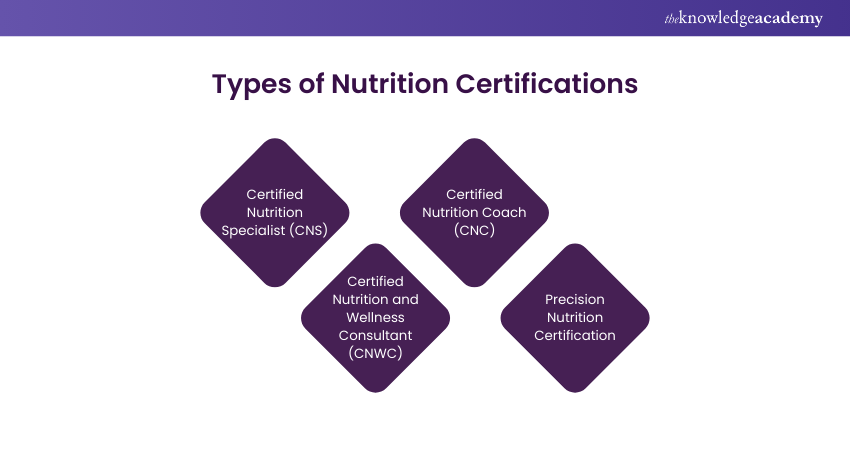
2) Specialised Certifications
Specialised certifications bolster your credibility and showcase your dedication to high standards of professionalism and competence. Notable certifications include:
a) Certified Nutrition Specialist (CNS): It requires a master's or doctoral degree and supervised practice hours offered by the Board for Certification of Nutrition Specialists (BCNS).
b) Certified Nutrition Coach (CNC): It focuses on coaching skills and behavior change strategies provided by the National Academy of Sports Medicine (NASM).
c) Certified Nutrition and Wellness Consultant (CNWC): It covers nutrition, wellness, and lifestyle coaching offered by the American Fitness Professionals & Associates (AFPA).
d) Precision Nutrition Certification: Focuses on the art and science of nutrition coaching, including behavior change and practical application.
Explore the keys to a healthier you! Join our Healthy Lifestyles Training and start living your best life today!
Developing Essential Skills
Being a successful Nutrition Coach requires more than just knowledge of nutrition. Key skills include:
a) Effective Communication: Clearly convey complex nutritional information in an understandable and relatable way, ensuring clients of all levels of health literacy can grasp and retain the information.
b) Active Listening: Understand the emotions, motivations, and challenges behind your clients' words. This allows you to provide personalized and relevant recommendations.
c) Empathy: Relate to clients' experiences and challenges to foster trust. Offer solutions that align with their reality, creating a safe space to facilitate communication and collaboration.
These skills will enhance your effectiveness and help you build lasting, impactful relationships with your clients.
Gaining in-depth Knowledge
Nutrition Coaching is all about being able to effectively convey nutrition recommendations to clients based on the scientific principles of nutrition. First, understand basic nutrients; carbohydrate, proteins, fats, vitamins, minerals and water and their functions for energy production, tissue formation, immune system and water respectively.
It is vital to become familiar with macronutrient and micronutrient specifics and how blood sugar, tissues, hormones, and other body processes are affected by them. Also, it is important to inform yourself on different eating plans and diets like mediterranean, vegan, keto, and fasting.
Learn about the importance, rationale, and concerns of such diets to diverse groups of people. These dietary approaches when applied to these health goals and conditions will improve the nutritional counselling that is expected from you.
Unlock your potential as a Nutrition Coach by enrolling in our Nutrition and Fitness Training course.
Understanding Client Needs
It is for this reason that Nutrition Coaching has to be based on knowledge of your clients. Goals, difficulties, preferences, and circumstances of each person are different. As a coach you need to understand them and guide your clients in a way that brings about those changes in their health and wellbeing for the better in the long run.
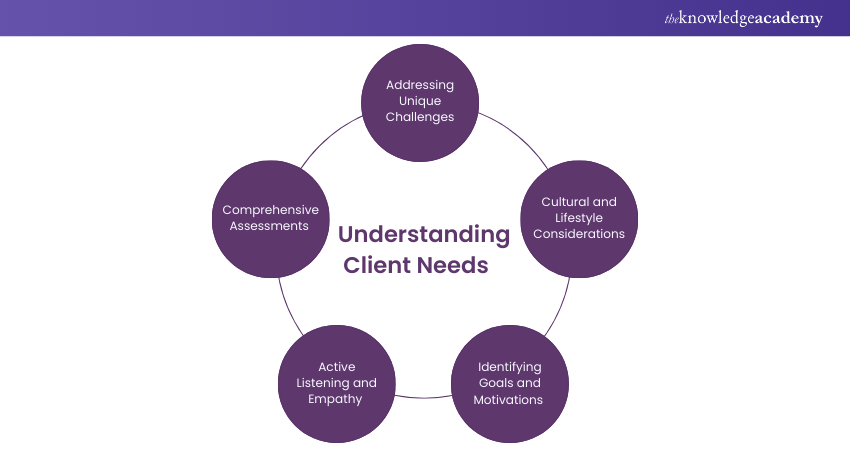
1) Comprehensive Assessments
Start with thorough initial assessments to gather detailed information about your clients' medical history, dietary habits, lifestyle, preferences, and goals. Engage in open, non-judgmental conversations to encourage sharing experiences, challenges, and aspirations. This holistic approach helps craft personalised nutrition plans that align with their circumstances.
2) Active Listening and Empathy
Active listening involves not only listening to but also understanding your clients' emotions, concerns, and motivations. Pay attention to tone, body language, and underlying feelings to uncover the factors influencing their dietary choices and behaviours. This empathy-driven approach fosters deeper understanding and personalised support.
3) Identifying Goals and Motivations
Understand what your clients hope to achieve through Nutrition Coaching, whether it’s weight loss, improved energy, better digestion, or managing a health condition. Grasping the "why" behind their objectives allows you to tailor guidance that resonates with their true motivations.
4) Cultural and Lifestyle Considerations
Be mindful of clients' cultural backgrounds and lifestyles, including norms, traditions, daily routines, work commitments, and family dynamics. Providing practical advice that fits seamlessly into their lives increases the likelihood of adherence and success.
5) Addressing Unique Challenges
Identify and address unique challenges and barriers each client faces, such as time constraints or emotional eating triggers. Collaboratively develop strategies to overcome these obstacles, enhancing the likelihood of successful behaviour change and long-term health improvement.
Building a clientele
As a Nutrition Coach, your expertise and guidance can positively transform lives. However, you need clients eager to embrace your coaching to make a meaningful impact. Building a clientele requires a strategic approach combining networking, marketing, and online presence. By implementing effective strategies, you can attract, engage, and retain clients committed to their health and well-being journey.
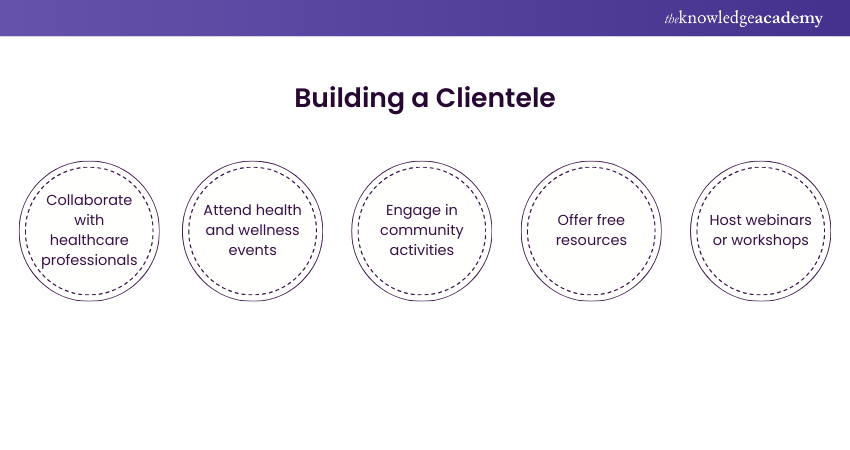
1) Collaborate with healthcare professionals: Connect with doctors, dietitians, fitness trainers, and other healthcare professionals. Referrals from trusted sources can provide a steady stream of potential clients.
2) Attend health and wellness events: Participate in workshops, seminars, and conferences related to health and wellness. These events allow you to form a network with professionals that think alike and potential clients.
3) Engage in community activities: Volunteer for health-related events, offer free seminars, or conduct nutrition workshops in your local community. This showcases your expertise and allows you to connect with individuals who value their health.
4) Offer free resources: Provide free downloadable guides, meal plans, or informative videos to demonstrate your expertise and attract potential clients.
5) Host webinars or workshops: Organise online webinars or in-person workshops on popular nutrition topics. This positions you as an authority in your field and attracts individuals interested in learning more.
Practical Experience
While a solid educational background is crucial for becoming a Nutrition Coach, practical experience sets you apart. It equips you with the skills needed to make a tangible impact on your clients' lives. Practical experience will enable you to apply what you know in real-world scenarios, refine your coaching techniques, and build the confidence necessary to guide individuals toward healthier lifestyles. Let us explore how gaining practical experience can shape your journey as a Nutrition Coach.
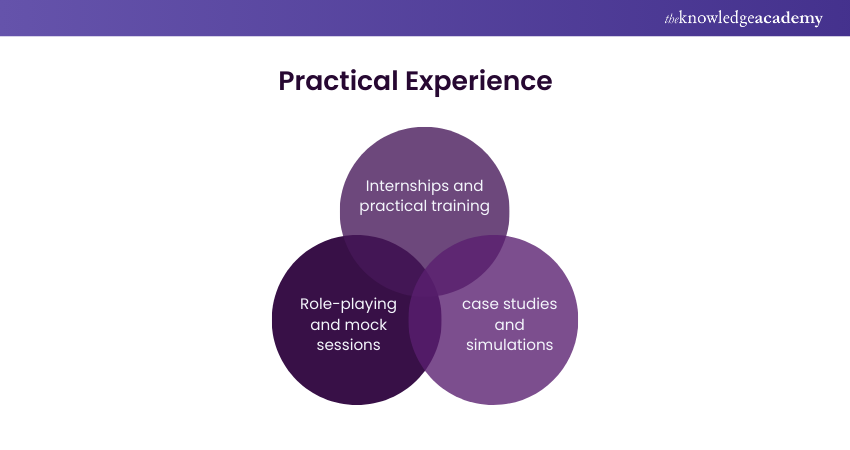
Internships and practical training are invaluable opportunities to immerse yourself in Nutrition Coaching. Many educational programs offer internships with clinics, wellness centres, or registered dietitians. During these experiences, you will observe experienced professionals in action, interact with clients, and even have the chance to take on coaching responsibilities under supervision. This hands-on exposure gives you a taste of the challenges and rewards of the profession.
Engaging with case studies and practical simulations enhances your problem-solving skills. Work through hypothetical scenarios where clients present diverse goals, challenges, and dietary preferences. This practice allows you to develop your analytical abilities, practice crafting personalised recommendations, and gain insight into the decision-making process of a Nutrition Coach.
Role-playing and mock coaching sessions offer a safe environment to practice your coaching skills. Partner with peers, mentors, or educators to simulate client interactions. This practice helps refine your communication, active listening, and motivational interviewing techniques. Constructive feedback from these sessions guides your improvement and prepares you for fundamental client interactions.
Legal and Ethical Considerations
As a Nutrition Coach, you hold a position of trust and responsibility in guiding individuals toward healthier lifestyles. Alongside your nutritional expertise, it is essential to understand and follow the legal and ethical considerations that govern your practice. These considerations ensure client safety, confidentiality, and the integrity of your coaching.
Legal Considerations
Define the scope of your practice and its limitations clearly. Understand the legal boundaries of Nutrition Coaching in your jurisdiction, including what services you can provide and when to refer clients to registered dietitians or healthcare professionals.
Ensure you possess the qualifications and certifications required to practice as a Nutrition Coach in your area. Comply with any licensing regulations and stay informed about any changes or updates.
Obtain informed consent from clients before providing services. Communicate the nature of your coaching, what clients can expect, and the potential outcomes. Ensure that clients understand the limits of your expertise and when specialised care might be necessary.
Consider liability insurance to protect yourself if legal claims arise from your coaching services. This coverage can safeguard you in situations where clients allege harm or dissatisfaction.
Ensure that your marketing materials rightly represent your qualifications and services. Avoid making false claims or a promise that you cannot deliver.
Ethical Considerations
Place the well-being of your clients above all else. Tailor your recommendations to their needs and goals, considering their health status, preferences, and cultural considerations.
Maintain strict confidentiality about your clients' personal information, including their health history, dietary habits, and progress. Obtain explicit permission before sharing any client details for educational or promotional purposes.
Strive for ongoing professional development to ensure your coaching skills and nutritional knowledge remain current. Only offer advice within your area of expertise and refer clients to registered dietitians or healthcare professionals when necessary.
Refrain from recommending specific products, supplements, or brands solely for financial gain. Base your recommendations on evidence-based nutritional science rather than personal or financial incentives.
Respect cultural diversity and tailor your guidance to include different dietary preferences, restrictions, and traditions. Be aware of potential cultural biases and avoid imposing your beliefs on clients.
Difference Between a Nutrition Coach and a Registered Dietitian
Registered dietitians (RDs) undergo more extensive education and training than nutrition coaches. They must complete a 900 to 1,200-hour supervised internship, pass an exam, and in most places, obtain a license to practice. This rigorous training qualifies them to:
a) Practice medical nutrition therapy
b) Develop and provide meal plans
These practices are beyond the scope of Nutrition Coaches.
Registered dietitians and Nutrition Coaches aren't mutually exclusive and often collaborate, much like an orthopedist working with a physical therapist. Many registered dietitians also earn Nutrition Coaching certifications that improve their coaching skills and their effectiveness.
Continuing Professional Development
As scientific research evolves, Nutrition Coaches must seek learning opportunities that enhance their knowledge as well as skills. Continuing Professional Development (CPD) ensures you provide up-to-date, evidence-based guidance and fosters personal and professional growth.
CPD keeps you informed about the latest research and best practices, translating into accurate advice and better client outcomes. It refines essential skills like communication and problem-solving, improving client interactions and motivation strategies. CPD also builds client trust, as clients prefer coaches who stay current and provide reliable advice.
Investing in CPD gives you a competitive edge, distinguishing you as an expert capable of handling complex dietary issues with innovative solutions. Networking with peers, mentors, and experts during CPD fosters valuable connections and idea exchange, supporting continuous learning.
Ultimately, CPD promotes personal and professional development, boosting your confidence and commitment to excellence. It is a transformative journey that empowers Nutrition Coaches to make lasting impacts on their clients' health and the industry.
Starting your Nutrition Coaching Career
Embarking on a Nutrition Coaching career is an exciting journey that can transform individuals' health and well-being. Start by obtaining a bachelor's or master's degree in nutrition or a related field to gain essential knowledge. Enhance your education with certifications from reputable organisations to boost credibility and learn key coaching skills.
Gain practical experience through internships, volunteering, or role-playing sessions to refine your techniques. Create yourself an online presence with a professional website and social media account for you to showcase your expertise and engage potential clients. Building a clientele requires networking, attending health events, and collaborating with healthcare professionals. Offer free consultations to introduce your approach and build rapport.
A successful Nutrition Coaching career involves continuous learning and skill refinement. Focus on understanding clients' needs, building relationships, and guiding them toward healthier, happier lives.
How long does it take to become a certified Nutrition Coach?
Becoming a certified Nutrition Coach varies based on individual circumstances and chosen pathways. Generally, it can take several months to a few years, depending on factors such as educational route, prior academic background, and certification requirements.
Obtaining a bachelor's or master's degree in nutrition or a related field can take four to six years. In contrast, pursuing specialised certifications from established organisations may take a few months to a year, including coursework, practical training, and exams.
Ultimately, the time required to become a certified Nutrition Coach reflects your commitment to comprehensive education, skill acquisition, and dedication to providing evidence-based guidance to enhance clients' well-being.
How much can I earn as a Nutrition Coach?
The earning potential of a Nutrition Coach can vary based on certain factors such as location, specialisation, clientele, and the range of services offered. Nutrition Coaches can generally earn anywhere from a modest to a substantial income. Entry-level Nutrition Coaches might earn a modest income as they start to build their client base and gain their experience.
Earnings can increase as they establish themselves and develop a reputation for delivering practical guidance. Those with advanced degrees, specialised certifications, and a strong track record of successful client outcomes may command higher fees.
Coaches offering supplementary services such as personalised meal plans, group workshops, or online courses can augment their income. Location also plays a role, as earning potential can be influenced by the local economy and the demand for Nutrition Coaching services. Ultimately, a Nutrition Coach's income reflects expertise, dedication, client rapport, and the ability to deliver valuable and sustainable health solutions.
Conclusion
Exploring "How to Become a Nutrition Coach" combines expertise and empathy. Mastering nutritional science and coaching techniques empowers coaches to steer clients toward enduring health enhancements. Ethical considerations, evidence-backed guidance, and a tailored approach build trust. This voyage demands perpetual learning, adaptation, and the ability to spark positive transformations. It is a pledge to foster well-being, cultivate relationships, and inspire the pursuit of healthier and happier existences.
Discover the science of healthy eating! Join our Nutrition Course and empower yourself to make informed dietary choices today!
Frequently Asked Questions

A Level 3 Nutrition and Health Certificate provides advanced knowledge in nutrition and health, covering dietary planning, health principles, and client support strategies.

Yes, you can make a living as a Nutrition Coach by building a client base, offering personalised coaching, and leveraging online platforms for broader reach.

The Knowledge Academy takes global learning to new heights, offering over 30,000 online courses across 490+ locations in 220 countries. This expansive reach ensures accessibility and convenience for learners worldwide.
Alongside our diverse Online Course Catalogue, encompassing 17 major categories, we go the extra mile by providing a plethora of free educational Online Resources like News updates, Blogs, videos, webinars, and interview questions. Tailoring learning experiences further, professionals can maximise value with customisable Course Bundles of TKA.

The Knowledge Academy’s Knowledge Pass, a prepaid voucher, adds another layer of flexibility, allowing course bookings over a 12-month period. Join us on a journey where education knows no bounds.

The Knowledge Academy offers various Healthy Lifestyles Training, including Nutrition Course, Nutrition and Fitness Training, Active and Healthy Lifestyles Training and Yoga Training. These courses cater to different skill levels, providing comprehensive insights into how to become a nutrition coach.
Our Health & Safety Blogs cover a range of topics related to Healthy Lifestyles, offering valuable resources, best practices, and industry insights. Whether you are a beginner or looking to advance your Health and Safety skills, The Knowledge Academy's diverse courses and informative blogs have got you covered.
Upcoming Health & Safety Resources Batches & Dates
Date
 Life Coach Training
Life Coach Training
Fri 14th Feb 2025
Fri 11th Apr 2025
Fri 13th Jun 2025
Fri 15th Aug 2025
Fri 10th Oct 2025
Fri 12th Dec 2025







 Top Rated Course
Top Rated Course



 If you wish to make any changes to your course, please
If you wish to make any changes to your course, please


